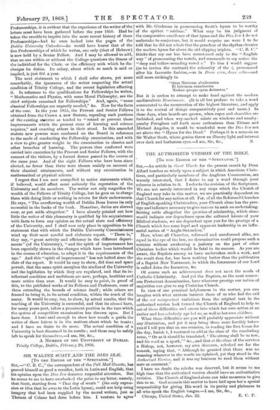THE AUTHORIZED VERSION OF THE BIBLE. [To THE EDITOR OF
THE "SPECTATOR."] SIR,—An article in Good Words for the present month by Dean Alford touches so wisely upon a subject in which American Chris- tians, and particularly members of the Anglican Communion, are warmly interested, that I desire to say a word through your columns in relation to it. I refer to the revision of the Scriptures. We are not merely interested in any steps which the Church of England may take in this matter, we are practically dependent on that Church for any action at all. For, of all the Reformed Churches of English-speaking Christendom, your Church alone has the pres- tige and influence necessary to give success to such an undertaking. Setting aside altogether the question of scholarship, which alone would indicate our dependence upon the cultured leisure of your Biblical students, we are dependent upon you for the prestige of a Church which has some legal and apparent leadership in an influ- ential nation of " Anglo-Saxondom."
Here, where all Churches, reformed and unreformed alike, are equal in the eye of the law, no denomination could propose such a revision without awakening a jealousy on the part of other Christian bodies which would be fatal to its success. As you are aware, the Baptists among us have undertaken such a work, and the result thus far, has been nothing better than the publication of a Baptist New Testament, in which the forerunner of our Lord is called John the Immerser, &c.
Of course such an achievement does not meet the needs of Catholic Christianity. And yet the Baptists, as the most numer- ous Protestant denomination, have whatever prestige our nation of majorities can give to any Christian Church.
In view of our practical helplessness in the matter, you can imagine with what anxious interest those of us who feel the evil of the not unimportant variations from the original text in the authorized version look toward the Church of England to help us out of those difficulties and errors into which her own action at an earlier and less scholarly age led us, as well as her own children.
What these difficulties are you will probably appreciate without any illustration, and yet it may bring them more forcibly before you if I tell you that on one occasion, in reading the first lesson for the day, Isaiah 1, I ventured to add at the close of the concluding verse, " Or as it should be translated, The strong shall be as tow, and his work as a spark,'" &c., and that at the close of the services a Bishop, not, however, my own diocesan, rebuked me for the remark, saying that, " Although he granted that there was no meaning whatever in the words unexplained, yet they stood in the Authorized Version, and it was my business to read them without note or comment."
I have no doubt the rebuke was deserved, but it seems to me high time that the authorized version should have an authoritative revision. The Church of England alone can take measures to give this to us. God seems in this matter to have laid upon her a special responsibility for giving His word in its purity and plainness to all who speak the English tongue.—I am, Sir, &c.,
Chicago, United States, Jan. 22. E. C. P.






























 Previous page
Previous page